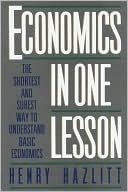More on this book
Community
Kindle Notes & Highlights
Read between
August 1 - August 12, 2020
Fallacies, when they have reached the popular stage, become anonymous anyway.
The bad economist sees only what immediately strikes the eye; the good economist also looks beyond. The bad economist sees only the direct consequences of a proposed course; the good economist looks also at the longer and indirect consequences. The bad economist sees only what the effect of a given policy has been or will be on one particular group; the good economist inquires also what the effect of the policy will be on all groups.
Nine-tenths of the economic fallacies that are working such dreadful harm in the world today are the result of ignoring this lesson. Those fallacies all stem from one of two central fallacies, or both: that of looking only at the immediate consequences of an act or proposal, and that of looking at the consequences only for a particular group to the neglect of other groups.
But need is not demand. Effective economic demand requires not merely need but corresponding purchasing power.
Technological discoveries and advances during a war may, for example, increase individual or national productivity at this point or that, and there may eventually be a net increase in overall productivity. Postwar demand will never reproduce the precise pattern of prewar demand. But such complications should not divert us from recognizing the basic truth that the wanton destruction of anything of real value is always a net loss, a misfortune, or a disaster, and whatever the offsetting considerations in a particular instance, can never be, on net balance, a boon or a blessing.
A bridge is built. If it is built to meet an insistent public demand, if it solves a traffic problem or a transportation problem otherwise insoluble, if, in short, it is even more necessary to the taxpayers collectively than the things for which they would have individually spent their money if it had not been taxed away from them, there can be no objection. But a bridge built primarily “to provide employment” is a different kind of bridge. When providing employment becomes the end, need becomes a subordinate consideration.
Yet our legislators do not present Full Production bills in Congress but Full Employment bills. Even committees of businessmen recommend “a President’s Commission on Full Employment,” not on Full Production, or even on Full Employment and Full Production. Everywhere the means is erected into the end, and the end itself is forgotten.
An export subsidy is a clear case of giving the foreigner something for nothing, by selling him goods for less than it costs us to make them.
The idea that an expanding economy implies that all industries must be simultaneously expanding is a profound error.


